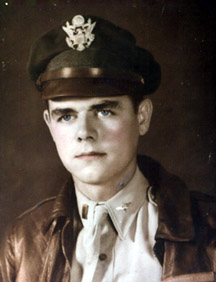
Established April 14, 1942
 |
American Ex-Prisoners of War
A not-for-profit, Congressionally-chartered veterans’ service organization advocating for former prisoners of war and their families.
Established April 14, 1942 |


Lt. Dan M. Williams, Jr.
|

Dan Williams Jr. 1982
|
|
| Last Name | First Name, Middle Init. | Nickname |
| Street Add. | City | State |
| Zip | Spouse | |
| Conflict | Branch of Service | Unit: |
| Theatre of Operation | Military Job | Where Captured |
| Date Captured | Time Interned | Camps |
| Date Liberated | Medals Received | Age at Capture |
| After the War ... | ||
The 2nd day I was forced to walk several hundred yards where I was given a bowl of potato soup. The next day on the way to interrogation, I was stopped by a German fighter pilot who spoke to me in German. I said I did not understand and was promptly slapped unconscious. The next day I was placed on a 3rd class coach and shipped to Frankfurt on Main for further interrogation. I was placed in solitary for 48 hours and then questioned. I was then placed in another compound to await shipment to a permanent camp. Total food from date of capture 6 days ago—2 bowls of soups and an occasional drink of water, 3 potatoes, 1/4 can of salmon, 1 cup of tea—was food received during 3 days at Frankfurt.
I was loaded on boxcar October 17, 1943 for transfer—about 40 POWs and two guards to each car— one half of an American Red Cross parcel was issued to each man for trip. We were in boxcars for 5 days and 4 nights with no additional food. We were allowed outside once a day for 2 or 3 minutes. Besides being filthy, hungry, cold and covered with body lice, I, for one, was near exhaustion, physically and mentally, when we reached our destination, Stalag Luft III, Sagan. We were marched from the boxcars to the nearby Center Compound and there had picture taken, a 3-minute hot shower and a thorough search. I still received no treatment for my head. Was allowed to keep my wool, electrically heated flying boots, as there were no other shoes to be had.
From this date, October 21, 1943, until January 28, 1945, I guess I was just an average POW— putting up with continual hunger, mental abuse, camp searches at any time of the day or night, 1 to 3 hour roll calls twice a day, no mail, no cigarettes, periodic "starvation" periods, and constant fear of being shot by Gestapo or SS Troops. I wore my wool boots the entire time because I never managed to get regular shoes that would fit. Beds were crude, wooden, 3-deck affairs with from 3 to 5 three-inch bed slats and straw mattresses. I used the same 5' square blankets for 18 months without being cleaned. Except during the summer month, I never slept without being fully clothed. One 40-watt bulb was the light for 12 men. To fill the time I read from 3 to 8 hours each day. Barracks were never heated except by body heat. Never sufficient fuel for cooking and over 100 men shared the same small cook stove. As for keeping clean, we had plenty of cold water year round. Body hair was usually shaved every 2 or 3 months to keep away the lice. I didn't spend one single day in Germany without feeling bugs crawling on my body.
The Russians neared Sagan on January 28, 1945 and we were out on a forced march the next 7 days. No good shoes or clothing, only what food we managed to carry from the camp, never any heat or hot water, snow blizzard 2 days, near "zero" degrees 3 days. My hands and feet froze until they cracked and bled. I fell on the ice and badly sprained my left knee which still gives me trouble at times.
We arrived at Spremburg February 5, 1945 and were loaded 60 men to a 40 & 8 boxcar. Each man received 1 loaf of bread and 1/2 Red Cross parcel for the coming trip. Three days and 4 nights in boxcar, we were allowed out twice. The only water we got was drained from the boiler of engine pulling our train. Two times on the trip we were left locked in cars during an air raid—Kassel and Munich—below freezing the whole trip.
Arrived at Stalag VITA, Moosburg, February 8, 1945. After waiting 2 days for a 3-minute shower and search, we were moved into the permanent part of the camp. There were very few exceptions, and I was not one, who were not sick with a bad cold and dysentery. One latrine served over 4,000 men, one water tap in each of 5 barracks for 800 men to use. No heat of any description. Parcels were very scarce and for the most part we lived on German rations for the next 3 months. A daily issue was a half pint of soup containing anything from grass to horsemeat, 1/2 a loaf of bread per man. Sometimes a spoonful of jam or margarine. A few boiled potatoes every other day and never any salt to help it down. As an extra on Sundays, 2 ounces of raw sausage. I know that the occasional parcel issue kept me from going 100% crazy. We managed to heat several cups of black, unsweetened tea every day. My weight was now down to 135 lbs.
Immediately after arrival in the States, we were given 60 day furloughs with practically no advice as to what should or could be done to regain our somewhat low state of health. In October, 1945 I arrived at Camp Gordon, GA for separation. I was processed out OK physically except for some items I requested on my physical exam. Thus ended my active military career.